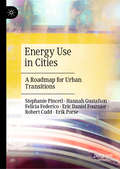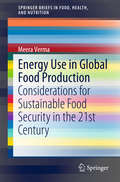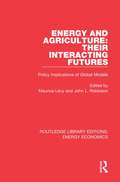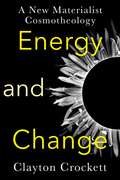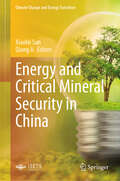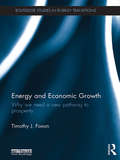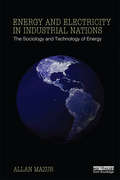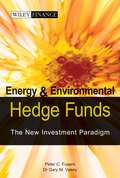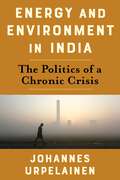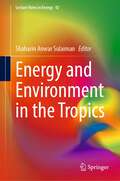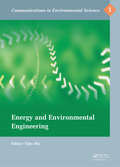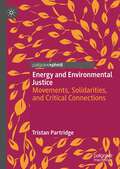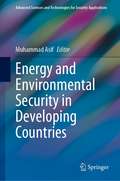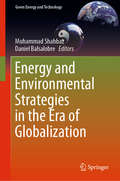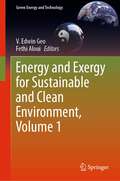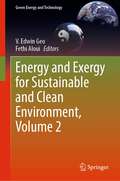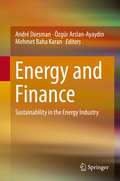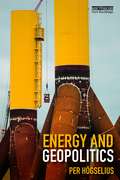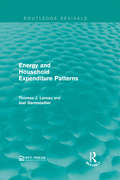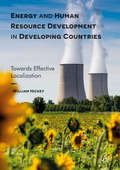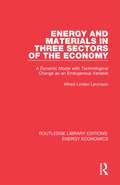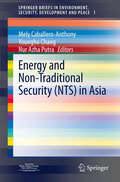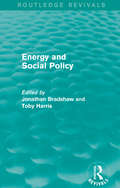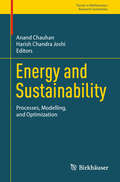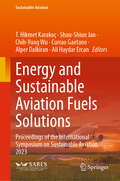- Table View
- List View
Energy Use in Cities: A Roadmap for Urban Transitions
by Stephanie Pincetl Hannah Gustafson Felicia Federico Eric Daniel Fournier Robert Cudd Erik PorseIn an era of big data and smart cities, this book is an innovative and creative contribution to our understanding of urban energy use. Societies have basic data needs to develop an understanding of energy flows for planning energy sustainability. However, this data is often either not utilized or not available. Using California as an example, the book provides a roadmap for using data to reduce urban greenhouse gas emissions by targeting programs and initiatives that will successfully and parsimoniously improve building performance while taking into account issues of energy affordability. This first of its kind methodology maps high-detail building energy use to understand patterns of consumption across buildings, neighborhoods, and socioeconomic divisions in megacities. The book then details the steps required to replicate this methodology elsewhere, and shows the importance of openly-accessible building energy data for transitioning cities to meet the climate planning goals of the twenty-first century. It also explains why actual data, not modeled or sampled, is critical for accurate analysis and insights. Finally, it acknowledges the complex institutional context for this work and some of the obstacles – utility reluctance, public agency oversight, funding and path dependencies. This book will be of great value to scholars across the environmental sectors, but especially to those studying sustainable urban energy as well as practitioners and policy makers in these areas.
Energy Use in Global Food Production
by Meera VermaThis Brief examines the sustainability of energy use in global food production and processing. The nexus between food, water, and energy are explored against a background of climate change. Current efforts to reduce the energy intensity of food and increase sustainability are explored. Food waste and its impact on energy is covered, including regional variations and nutrient recycling methods. Energy Use in Global Food Production uses case studies to illustrate how food production and processing is a significant contributor to anthropogenic climate change. Modern industrial agriculture uses fossil fuel to grow crops and produce fertilizers, pesticides and farm machinery. Additional energy is used to transport and process food at a primary and secondary level. With the median forecast for global population at more than 9 billion by 2030, a 30% increase over the current population, energy efficient food processing will be of increasing importance. This Brief provides an overview of current energy efficient food processing methods looks at the way forward as demands continue to increase.
Energy and Agriculture: Policy Implications of Global Models (Routledge Library Editions: Energy Economics)
by Maurice Lévy John L. RobinsonOriginally published in 1984, this volume examines the consequences of increasing energy prices on agricultural production. It discusses whether it is possible to use agriculture to produce energy without endangering the food supply for the highly populated areas of the devloping world. Analyzing the global consquences of the 'food energy nexus' at the turn of the millenium it asks whether there will be a good crisis in those same developing countries which have suffered from the energy crisis. The editors and contributors are high-level specialists of global modelling in energy and agriculture and decision makers involved in food and agriculture planning in the developing world.
Energy and Change: A New Materialist Cosmotheology (Insurrections: Critical Studies in Religion, Politics, and Culture)
by Clayton CrockettAs humanity continues to consume planetary resources at an unsustainable rate, we require not only new and renewable forms of energy but also new ways of understanding energy itself. Clayton Crockett offers an innovative philosophy of energy that cuts across a number of leading-edge disciplines. Drawing from contemporary philosophies of New Materialism, non-Western traditions, and the sciences, he develops a comprehensive vision of energy as a material process spanning physics, biology, politics, ecology, and religion.Crockett argues that change is foundational to material reality, which is ceaselessly self-organizing. We can observe energy’s effects in the operations of natural selection as well as those at work in human societies. Matter and energy are not an oppositional binary; rather, they are expressions of how change functions in the universe. Ultimately, Crockett argues, we can conceive of God neither as a deity nor as a being but as the principle of change.Informed by cutting-edge theoretical discourses in thermodynamics, science studies, energy humanities, systems theory, continental philosophy, and radical theology, Energy and Change draws on theorists such as Gilles Deleuze, Catherine Malabou, Slavoj Žižek, Karen Barad, Bruno Latour, and Kojin Karatani as well as ideas about spirituality, society, and nature from Amerindian, Vodou, and Neo-Confucian traditions. A foundational work in New Materialist philosophy of religion, this book offers compelling new insights into the structure of the cosmos and our place in it.
Energy and Critical Mineral Security in China (Climate Change and Energy Transition)
by Qiang Ji Xiaolei SunThis book focuses on the hotspots and frontier issues of China&’s energy and critical mineral security strategy, aiming to develop a general framework to understand the new security landscape of constructing a modern energy system and accelerating the low-carbon transition. It attempts to sketch out the core issues of energy and critical mineral security in China&’s current and future low-carbon transition process and then bring forward a combination of theoretical and empirical analysis on the essential issues. This book ranges from general discussions of current essential issues in China&’s energy and critical mineral security to quantitative analysis of key themes, combining the strategy and planning of resource sectors with the practical experience of the energy and mining industry. It aims to present an overview of energy and critical mineral security in China&’s low-carbon transition, facilitating the demands for both academic research and policy-making. While the materials can provide useful knowledge to policymakers, the book can also inspire new research ideas in the relevant area.
Energy and Economic Growth: Why we need a new pathway to prosperity (Routledge Studies in Energy Transitions)
by Timothy J. FoxonAccess to new sources of energy and their efficient conversion to provide useful work have been key drivers of economic growth since the industrial revolution. Western countries now need to transform their energy systems and move away from the single-minded pursuit of economic growth in order to reduce our carbon emissions, and to allow the environmental space for other countries to develop in a more sustainable way. Achieving this requires understanding of the dynamics of economic and industrial change with appreciation of the dependence of economies on ecological systems. Energy and Economic Growth thus examines the links between three issues: history of energy sources, technologies and uses; ecological challenges associated with the current dominant economic growth paradigm; and the future low carbon energy transition to mitigate human-induced climate change. Providing a historical understanding of the relevant connections between physical, social and economic changes, the book enables the reader to better understand the connection between their own energy use and global economic and environmental systems, and to be able to ask the right questions of our political and business leaders. This is a valuable resource for students, scholars and policy makers with an interest in energy, climate change and economic thinking.
Energy and Electricity in Industrial Nations: The Sociology and Technology of Energy
by Allan MazurEnergy is at the top of the list of environmental problems facing industrial society, and is arguably the one that has been handled least successfully, in part because politicians and the public do not understand the physical technologies, while the engineers and industrialists do not understand the societal forces in which they operate. In this book, Allan Mazur, an engineer and a sociologist, explains energy technologies for nontechnical readers and analyses the sociology of energy. The book gives an overview of energy policy in industrialised countries including analysis of climate change, the development of electricity, forms of renewable energy and public perception of the issues. Energy is a key component to environment policy and to the workings of industrial society. This novel approach to energy technology and policy makes the book an invaluable inter-disciplinary resource for students across a range of subjects, from environmental and engineering policy, to energy technology, public administration, and environmental sociology and economics.
Energy and Environment Hedge Funds
by Peter C. Fusaro Gary M. VaseyPraise for Energy & Environmental Hedge Funds: The New Investment Paradigm "I highly recommend this book for those investors interested in energy and environmental hedge funds. It is a great handbook on these topics. The authors make a difficult subject easy for investors to understand. Energy and Environmental Hedge Funds are both the newest and next area for hedge fund investment and diversification. " -Lisa Vioni, President, HedgeConnection. com "Peter Fusaro and Gary Vasey have done a great jo9b in compiling all of the background information that a newcomer to energy investing should have. This insightful book helps in determining how best to gain exposure to the rapidly changing energy trading sector. " -Raj Mahajan, President & Co-Founder, SunGard Kiodex "The entry of opportunistic hedge funds into the energy sector is creating a sea of change for the industry. Fueled by pension funds and institutional investors, hedge funds are attracted to the petroleum industry because the current price volatility provides generous returns for their investors. However, these investments are not without risk. Gary Vasey and Peter Fusaro explain the ins and outs of it all in their insightful narrative. " -Don Stowers, Editor, Oil & Gas Financial Journal "Peter Fusaro and Gary Vasey write about energy and environmental hedge fund markets with greater style, aplomb, and insight that any other observers of financial high streets worldwide. . . . Outlining some of the early and provocative details of an industry's youthful achievement and potential, it is likely that this exposition by two of the energy and financial world's most credible experts will become a seminal work. " -Ethan L. Cohen, Director, Utility and Energy Technology, UtiliPoint International, Inc.
Energy and Environment in India: The Politics of a Chronic Crisis (Center on Global Energy Policy Series)
by Johannes UrpelainenIndia is driving some of the most important trends in global energy markets—with vast environmental implications. As the country grows wealthier, Indians are buying more cars, air conditioners, plane tickets, and other goods that increase demand for fossil fuels. At the same time, the country still faces widespread poverty, and it struggles to address persistent environmental and energy-sector problems, from frequent power outages to a significant number of deaths linked to air pollution.Johannes Urpelainen provides an expert guide to India’s energy and environmental issues that incorporates both domestic and global perspectives. He details how unequal economic development and rapid population growth have brought the country to its current state: a potential engine of the world economy hampered by environmental hazards and energy poverty. Urpelainen argues that institutional shortcomings have led wealthier Indians to find private solutions that protect them from threats such as air pollution and heat waves, but exclude the poor. The retreat of the rich limits the state’s ability to regulate the energy sector or address environmental degradation. Urpelainen examines India’s most severe environmental crises, considering how climate disruptions are affecting the country’s present and future. He analyzes India’s role in global environmental politics and assesses the prospects of achieving a more sustainable society. Useful and accessible, this book also offers pragmatic solutions to help overcome the constraints on effective energy and environmental policy.
Energy and Environment in the Tropics (Lecture Notes in Energy #92)
by Shaharin Anwar SulaimanThe tropical zones are dominated by developing countries, which mainly face problematic environmental issues. Different than four-season countries, tropical countries have a continuous summer-like season and therefore they are rich in clean energy sources like solar and biomass. Hence, the mitigations of environment and energy issues in the tropics would require specific understanding and different approach to solutions. This book offers an assortment of studies on scenarios of environment as well as energy demand and power generation technologies in the tropics. Many of the countries within the tropics are highly populated, and this results in various problems related to the environment and energy. The demand for energy in these countries keeps increasing but concurrently there are also environmental issues that require serious attention. As the global concern on the environment is alarming today, the choice of power generation should be of the cleanest possible resource. This various reports on research activities carried out in the tropics on the aspect of environment and energy presented in this book are highly beneficial for those who like to see an improvement in the tropics with regard to environment and energy systems.
Energy and Environmental Engineering: Proceedings of the 2014 International Conference on Energy and Environmental Engineering (ICEEE 2014), September 21-22, 2014, Hong Kong (Communications in Environmental Science)
by Yijin WuThe 2014 International Conference on Energy and Environmental Engineering (ICEEE 2014) was held September 21-22, 2014 in Hong Kong. This proceedings volume assembles papers from various professionals, leading researchers, engineers, scientists and students and presents innovative ideas and research results focused on Energy and Environmental Engine
Energy and Environmental Justice: Movements, Solidarities, and Critical Connections
by Tristan PartridgeThis book reconnects energy research with the radical, reflexive, and transformative approaches of Environmental Justice. Global patterns of energy production and use are disrupting the ecosystems that sustain all life, disproportionately affecting marginalized groups. Addressing such injustices, this book examines how energy relates to structural issues of exploitation, racism, colonialism, extractivism, the commodification of work, and the systemic devaluing of diverse ‘others.’ The result is a new agenda for critical energy research that builds on a growing global movement of environmental justice activism and scholarship. Throughout the book the author reframes ‘transitions’ as collaborative projects of justice that demand structural change and societal shifts to more equitable and reciprocal ways of living. This book will be an invaluable resource for students, scholars, and practitioners interested in transforming energy systems and working collectively to build just planetary futures.
Energy and Environmental Security in Developing Countries (Advanced Sciences and Technologies for Security Applications)
by Muhammad AsifThis book presents a comprehensive account of the energy and environmental security perspectives of the developing countries. To address the subject comprehensively, it covers four geographically diverse clusters of developing countries from across the world. The regions particularly focused on are: South Asia, South East Asia, Sub Sahara Africa, and Latin America. It is a valuable contribution to the debate, and policy and research activities around the subjects of energy and environmental security in the developing countries and beyond.The book covers the interwoven subjects of energy security and environmental security in the context of developing countries for the first time. It discusses the latest dimensions, challenges, and solutions around taking into account technical, economic, social, and policy perspectives. It incorporates up-to-date data, case studies, and comparative assessment.This edited book has contributions from established as well as emerging scholars from around the world. It benefits a wide range of stakeholders from the fields of energy, environment, and sustainable development. It is of help to academics, researchers, and analysts in these fields besides having appeal for policymakers, and national and international developmental organizations. It also helps developing countries to learn from each other’s experiences.
Energy and Environmental Strategies in the Era of Globalization (Green Energy and Technology)
by Muhammad Shahbaz Daniel BalsalobreThis book provides readers with cutting-edge techniques that can be applied to energy and environmental economics. Further, it highlights the effects that both globalization and economic growth have on the environment. In addition to offering a broader perspective on the relationship between environmental pollution, energy consumption and economic growth, the book studies the relationship between economic growth and environmental damage by drawing on the theoretical hypothesis of the Environmental Kuznets Curve. The book presents new econometric techniques and innovative approaches to the study of the energy economy. Accordingly, it can be used to help analyse the current state of the energy economy, the environment and globalization, and can serve as a theoretical reference manual for doctoral students and academics seeking new analytical techniques.
Energy and Exergy for Sustainable and Clean Environment, Volume 1 (Green Energy and Technology)
by Fethi Aloui V. Edwin GeoThis multi-disciplinary book presents the most recent advances in exergy, energy, and environmental issues. Volume 1 focuses on fundamentals in the field and covers current problems, future needs, and prospects in the area of energy and environment from researchers worldwide. Based on some selected lectures from the Eleventh International Exergy, Energy and Environmental Symposium (IEEES-11) and complemented by further invited contributions, this comprehensive set of contributions promote the exchange of new ideas and techniques in energy conversion and conservation in order to exchange best practices in "energetic efficiency." Included are fundamental and historical coverage of the green transportation and sustainable mobility sectors, especially regarding the development of sustainable technologies for thermal comforts and green transportation vehicles. Furthermore, contributions on renewable and sustainable energy sources, strategies for energy production, and the carbon-free society constitute an important part of this book.
Energy and Exergy for Sustainable and Clean Environment, Volume 2 (Green Energy and Technology)
by Fethi Aloui V. Edwin GeoThis multi-disciplinary book presents the most recent advances in exergy, energy, and environmental issues. Volume 2 focuses on fundamentals in the field and covers current problems, future needs, and prospects in the area of energy and environment from researchers worldwide. Based on some selected lectures from the Eleventh International Exergy, Energy and Environmental Symposium (IEEES-11) and complemented by further invited contributions, this comprehensive set of contributions promote the exchange of new ideas and techniques in energy conversion and conservation in order to exchange best practices in "energetic efficiency." Included are fundamental and historical coverage of the green transportation and sustainable mobility sectors, especially regarding the development of sustainable technologies for thermal comforts and green transportation vehicles. Furthermore, contributions on renewable and sustainable energy sources, strategies for energy production, and the carbon-free society constitute an important part of this book.
Energy and Finance
by André Dorsman Özgür Arslan-Ayaydin Mehmet Baha KaranThis book analyses how socially responsible investments as well as the rising importance of Islamic finance are linked to the shift towards renewable energy. Academics and practitioners in the field take a global perspective and present case studies from several countries. The book is divided into three parts: The first part sheds new light on the energy shift towards renewable energy. The second shows the increasing interest of investors in sustainability, and the authors argue that investors not only look at expected returns and risks, but also at social returns. Finally, the third part explains the need for social returns in Islamic finance, which cannot be explained by traditional finance theory. This is the fifth volume in a series on energy organized by the Centre for Energy and Value Issues (CEVI).
Energy and Geopolitics
by Per HögseliusThe idea that energy shapes and is shaped by geopolitics is firmly rooted in the popular imagination – and not without reason. Very few countries have the means to secure their energy needs through locally available supplies; instead, enduring dependencies upon other countries have developed. Given energy’s strategic significance, supply systems for fuels and electricity are now seamlessly interwoven with foreign policy and global politics. Energy and Geopolitics enables students to enhance their understanding and sharpen their analytical skills with respect to the complex relations between energy supply, energy markets and international politics. Per Högselius guides us through the complexities of world energy and international energy relations, examining a wide spectrum of fossil fuels, alongside nuclear and renewable energies. Uniquely, the book also shows how the geopolitics of energy is not merely a matter for the great powers and reveals how actors in the world’s smaller nations are as active in their quest for power and control. Encouraging students to apply a number of central concepts and theoretical ideas to different energy sources within a multitude of geographical, political and historical contexts, this book will be a vital resource to students and scholars of geopolitics, energy security and international environmental policy and politics.
Energy and Household Expenditure Patterns (Routledge Revivals)
by Joel Darmstadter Thomas J. LareauOriginally published in 1983, Energy and Household Expenditure Patterns claimed that two-thirds of energy consumption in the United States came from households. This study aimed to estimate the expected changes in household activities and how this would affect energy consumption in the country as a whole. Also discussed are implications of direct energy purchases and spending on energy goods in households as well as predicting the growth in energy consumption leading up to the year 2000. This title will be of interest to students of Environmental Studies and Economics.
Energy and Human Resource Development in Developing Countries: Towards Effective Localization
by William HickeyThis book is about engaging and empowering people through their own domestic resources, by using upstream energy to create larger downstream employment opportunities. Incorporating sustainability, resource enhancement, and energy responsibility can generate awareness and better utilization of the resources and reduce reliance on foreign aid and economic development programs, which reinforce a North/ South consumption-based economy rather than empower the localized population. <P><P> The author proposes a new paradigm of employee development, localized engagement, and empowerment for resource-rich developing Asian countries, based on the utilization and upbraiding of their resources in-situ. Here scholars, policymakers, and investors will find that human resource development (HRD) can structure constructive change through criterion-based education and reap economic prosperity.
Energy and Materials in Three Sectors of the Economy: A Dynamic Model with Technological Change as an Endogenous Variable (Routledge Library Editions: Energy Economics)
by Alfred Linden LevinsonOriginally published in 1979, this study develops a model that explains the rate of adoption of an innovation in an industry - i.e the impact of technological change upon the utilization of selected materials and energy resources in the steel, alluminium and metal can industries. Each of the three industries is examined and in subsequent chapters the model is developed, applied and evaluated.
Energy and Non-Traditional Security (NTS) in Asia
by Mely Caballero-Anthony Youngho Chang Nur Azha PutraTraditional notions of security are premised on the primacy of state security. In relation to energy security, traditional policy thinking has focused on ensuring supply without much emphasis on socioeconomic and environmental impacts. Non-traditional security (NTS) scholars argue that threats to human security have become increasingly prominent since the end of the Cold War, and that it is thus critical to adopt a holistic and multidisciplinary approach in addressing rising energy needs. This volume represents the perspectives of scholars from across Asia, looking at diverse aspects of energy security through a non-traditional security lens. The issues covered include environmental and socioeconomic impacts, the role of the market, the role of civil society, energy sustainability and policy trends in the ASEAN region.
Energy and Social Policy (Routledge Revivals)
by Jonathan Bradshaw Toby HarrisEnergy price rises have been amongst the biggest change that has taken place in our society over the last few decades. Their impact, particularly when this book was first published in 1983, had a growing importance in social policy, practice and research, and fuel was, and still is, a major public issue. This collection of essays describes how any why domestic fuel prices have been rising faster than other prices and incomes, what impacts this has on domestic budgets, and the extent of ‘fuel poverty’. The resulting problems of debts, disconnections, cold conditions and hypothermia are discussed by specialists in these fields. This book is ideal for students of economics and social policy.
Energy and Sustainability: Processes, Modelling and Optimization (Trends in Mathematics)
by Anand Chauhan Harish Chandra JoshiThis volume addresses SDG 7 (Affordable and Clean Energy) and SDG 12 (Sustainable Consumption and Production). By 2030, therefore, people have to substantially increase their share of renewable energy. The book focuses on waste as primary sources of biomass that can fulfill energy requirements for sustainable development. It also discusses various related topics such as energy production methods, a mathematical model for the development of a sustainable biofuels supply chain, economic analysis, optimization techniques, multiple-criteria decision-making and mixed-integer linear programming and existing and emerging policies that encourage the switch to renewable energy. It is committed to fusing science and technology in a way that assures a sustainable future and addresses major topics on biofuels: biomass, bioenergy, biodiesel, bioethanol, biogas modelling and their supply chain management, inventory control and optimization.The 2030 Agenda for Sustainable Development, adopted by all United Nations Member countries in 2015, provides a shared blueprint for peace and prosperity for people and the planet, now and into the future. The book uses an interdisciplinary approach and provides solutions to energy requirements by using emerging technology and nanotechnologies. It explores a technical breakdown of the tools that may be utilized to convert biomass into usable energy forms. At the end of the book, a description of the social and economic aspects of renewable energy and minimization of bioenergy cost is presented. The book is useful to students, researchers, industry experts and anybody in the adoption of renewable energy. It covers the complete course in the fundamentals of biomass feedstock and their supply chain management resources at the graduate level in engineering.
Energy and Sustainable Aviation Fuels Solutions: Proceedings of the International Symposium on Sustainable Aviation 2023 (Sustainable Aviation)
by Alper Dalkiran Ali Haydar Ercan T. Hikmet Karakoç Shau-Shiun Jan Chih-Yung Wu Currao GaetanoSustainable aviation is a long-term strategy to provide innovative solutions to the aviation industry's challenges. The International Symposium on Sustainable Aviation is a multi-disciplinary symposium that presents research on sustainability-based issues and future trends in aviation from an economic, social, and environmental perspective. The conference provides a platform offering insights on a broad range of current topics in aviation, such as improving aircraft fuel efficiency, fostering the use of biofuels, minimizing environmental impact, mitigating GHG emissions, and reducing engine and airframe noise. ISEAS allows researchers, scientists, engineers, practitioners, policymakers, and students to exchange information, present new technologies, and developments. Also, discuss future direction, strategies, and priorities in aviation and sustainability.
